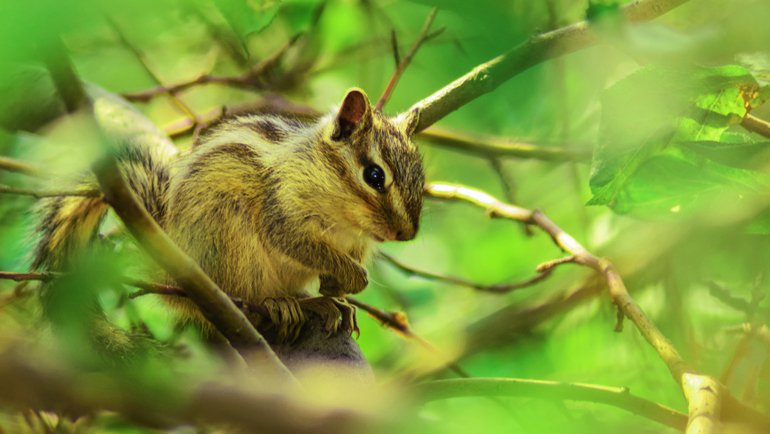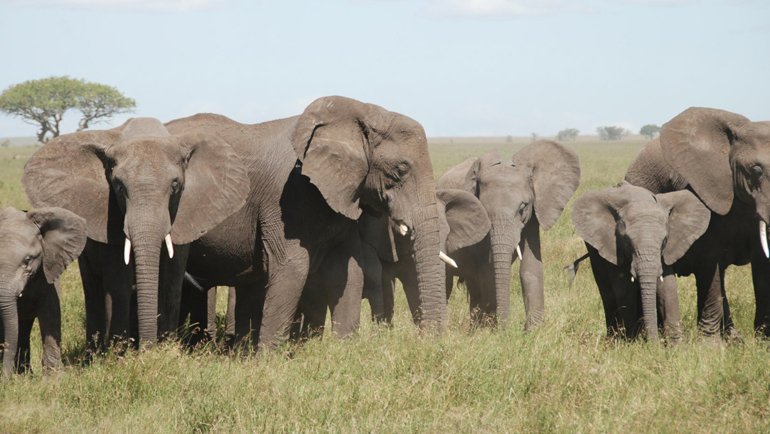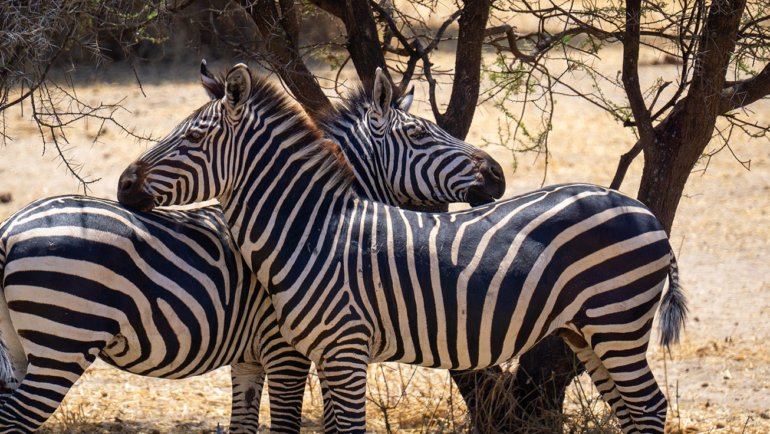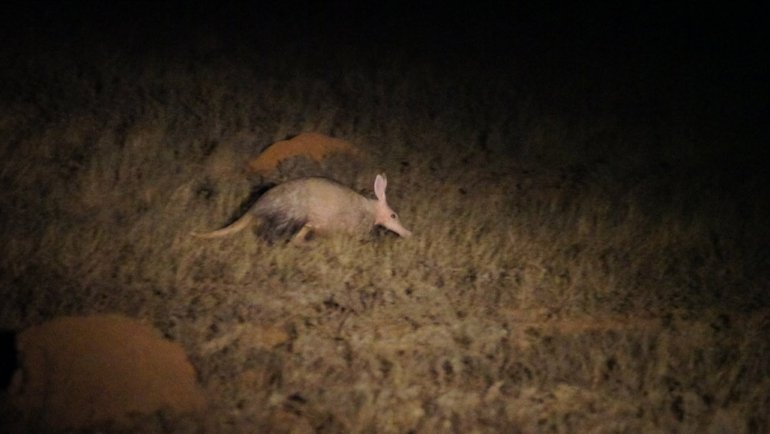The African Wild Dog, often recognized by its mosaic coat of red, black, brown, white, and yellow patches, roams the vast plains and woodlands of sub-Saharan Africa. As one of the continent’s most efficient predators, they boast a hunting success rate that eclipses that of the mighty lion.
However, despite their prowess, these “painted wolves” are not at the top of the food chain. In the intricate web of the African ecosystem, African Wild Dogs face threats from several formidable predators. Let’s delve into understanding who these threats are and how they impact the life of an African Wild Dog.
5 Predators of the African Wild Dog
Lions
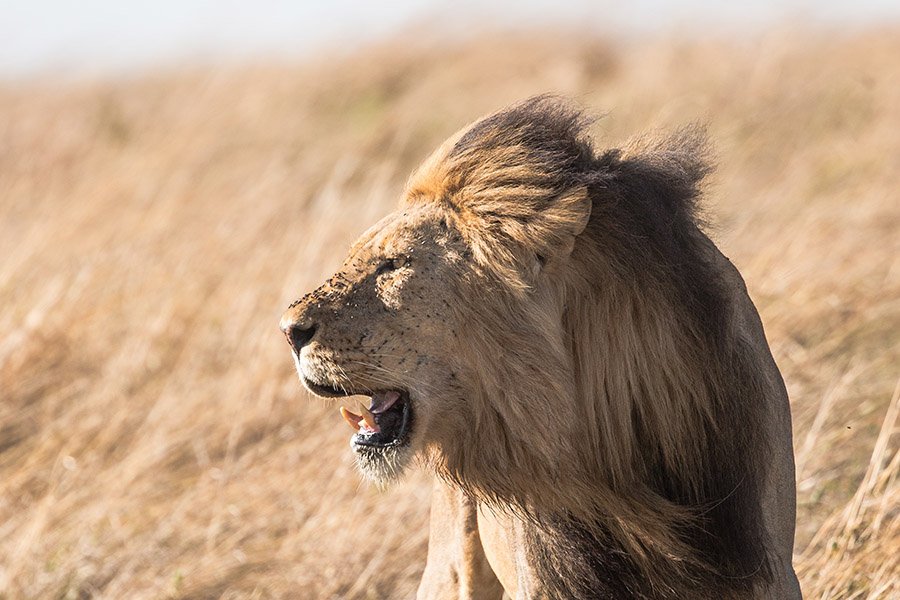
The undisputed kings of the African plains, lions are the primary natural threat to African Wild Dogs. More often than not, lions will kill wild dogs when the two species cross paths. Interestingly, this animosity isn’t typically rooted in hunger. Lions rarely consume wild dogs after killing them. The primary reason behind these fatal encounters seems to be competition.
Both species target similar prey, and eliminating the wild dogs means less competition for food. While adult wild dogs can sometimes escape these confrontations, pups are particularly vulnerable, often falling victim during lion raids on their dens.
Hyenas
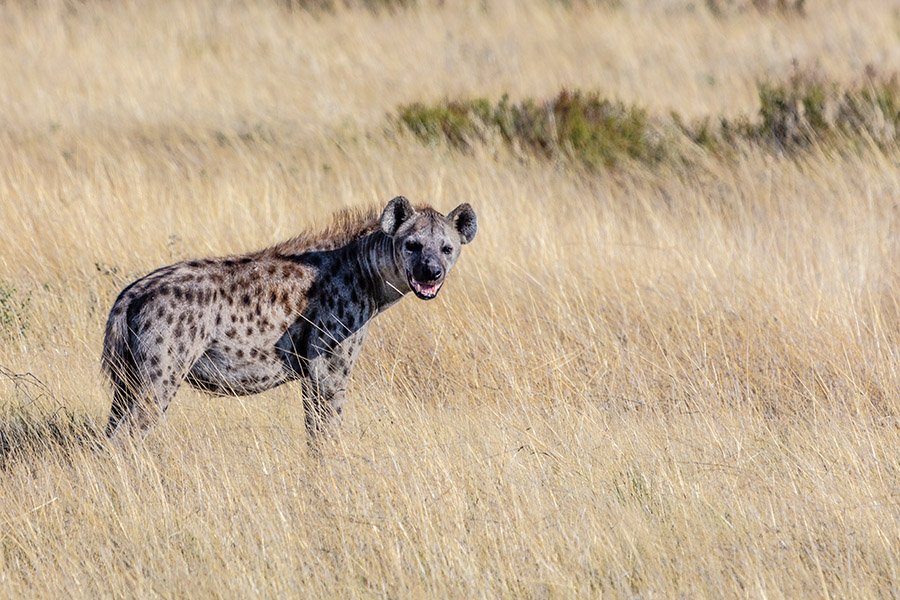
Spotted hyenas, with their cackling laughs and formidable jaws, are frequent adversaries of the African Wild Dogs. These two species often clash over kills, with hyenas being notorious for their scavenging habits. They’re known to steal freshly made kills from the wild dogs.
Moreover, during confrontations, if hyenas outnumber the wild dogs, they might attempt to kill especially vulnerable members of the pack, like the pups. The dynamics of these confrontations can shift dramatically based on pack and clan sizes. In some instances, a large wild dog pack can successfully defend its kill against hyenas or even chase them away.
Leopards
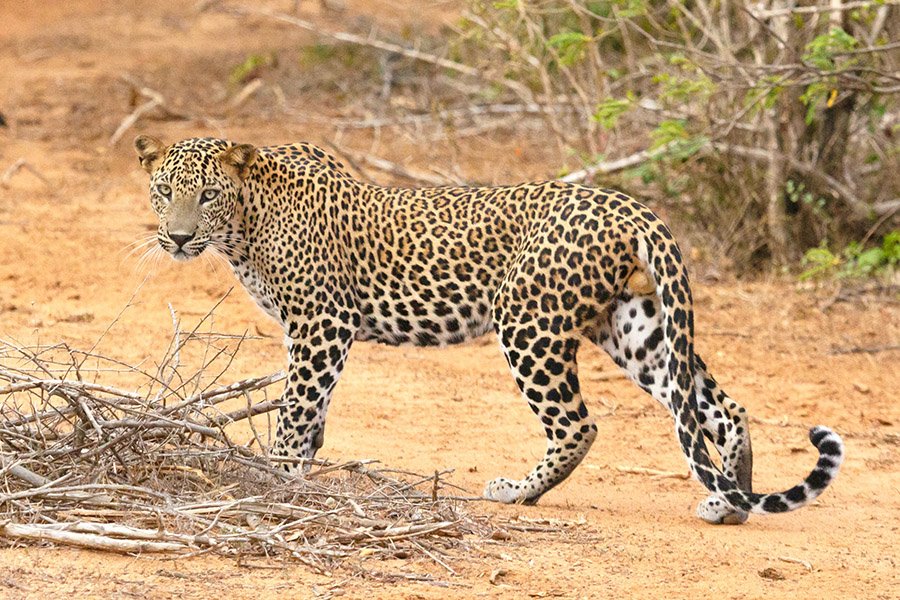
These stealthy big cats, adept at ambush, are not the most frequent threats to African Wild Dogs but pose significant danger to their pups. With leopards being solitary hunters and climbers, they might spot a wild dog den while prowling and take the opportunity to snatch a pup.
The dense and secluded areas where leopards often reside are the same regions where wild dogs might choose to raise their young, leading to these unfortunate encounters.
Crocodiles
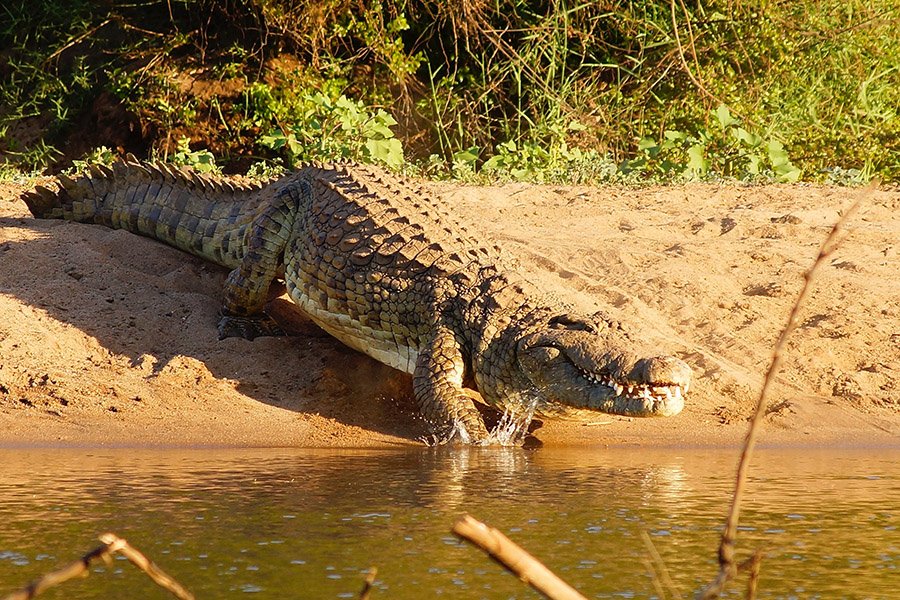
Watering holes in Africa are bustling hubs of activity and danger. While African Wild Dogs are always on alert for terrestrial threats, submerged Nile crocodiles present a lurking danger.
As wild dogs approach water sources to drink, especially in regions like the Okavango Delta, they might become prey to these opportunistic reptiles. Again, while adults might evade in time due to their agility, pups lagging behind or those too curious might fall victim.
Humans
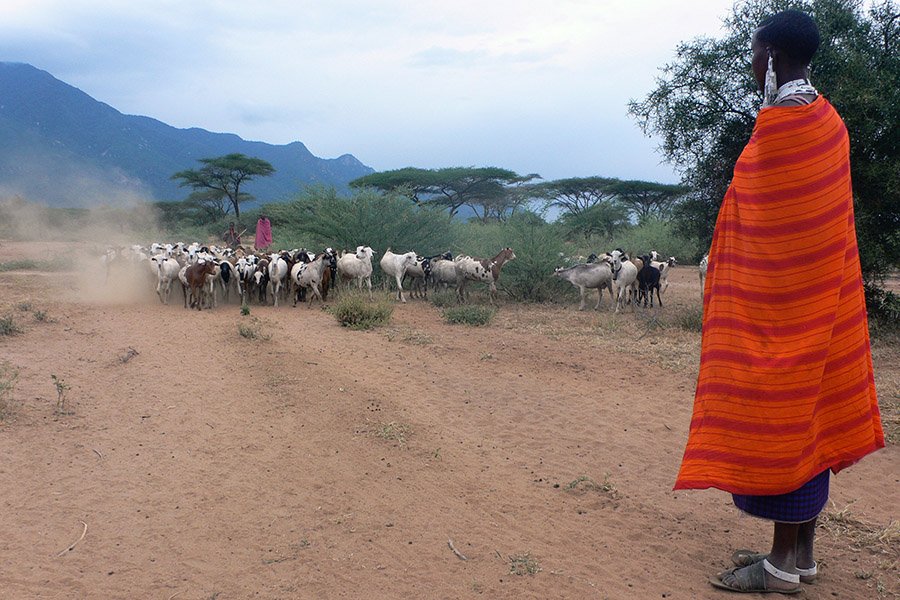
The relationship between humans and African Wild Dogs is complicated and full of challenges. While they’re not natural predators in the traditional sense, humans pose one of the most significant threats to wild dogs. As urbanization and agricultural activities expand, wild dogs lose their habitats, often getting caught in snares set for other animals.
Moreover, in areas where livestock farming is prevalent, wild dogs might be killed in retaliation for preying on domesticated animals. These conflicts, combined with road accidents and diseases transmitted from domestic dogs, have made humans an indirect but profound threat to their survival.
How Do African Wild Dogs Defend Themselves?
Even in the face of constant danger, the African Wild Dog has evolved a set of strategies to protect its pack and ensure the survival of its members. Here’s a closer look at these survival tactics:
Pack Mentality: In the animal kingdom, there’s strength in numbers, and this is profoundly true for the African Wild Dog. These animals thrive and survive due to their strong social structure. When under threat, they present a united front. This unity becomes especially prominent when pups, the most vulnerable members of the pack, are under threat. Together, they can deter or fend off many potential threats.
Avoidance: The best way to win a fight, sometimes, is to avoid it altogether. Wild dogs are highly strategic and will often prefer to evade larger predators like lions rather than confront them. Their keen senses and knowledge of their terrain enable them to sidestep unnecessary conflicts.
Distractive Tactics: In dire situations, especially when pups are at risk, adult wild dogs may employ distractions. Some members might attempt to draw the attention of the threat away, acting as decoys, giving the rest of the pack, particularly the pups, a chance to retreat to safety.
Vocalizations: Communication is vital. Wild dogs employ a range of vocalizations, from high-pitched calls to deep bellows, to convey different messages. Some sounds act as alarms, alerting the pack to impending danger, while others rally members together or coordinate strategic movements.
Territorial Behavior: To establish their presence and deter potential threats, wild dogs mark their territories. This behavior not only signifies their dominion over an area but also communicates to other species, including potential predators, to keep their distance.
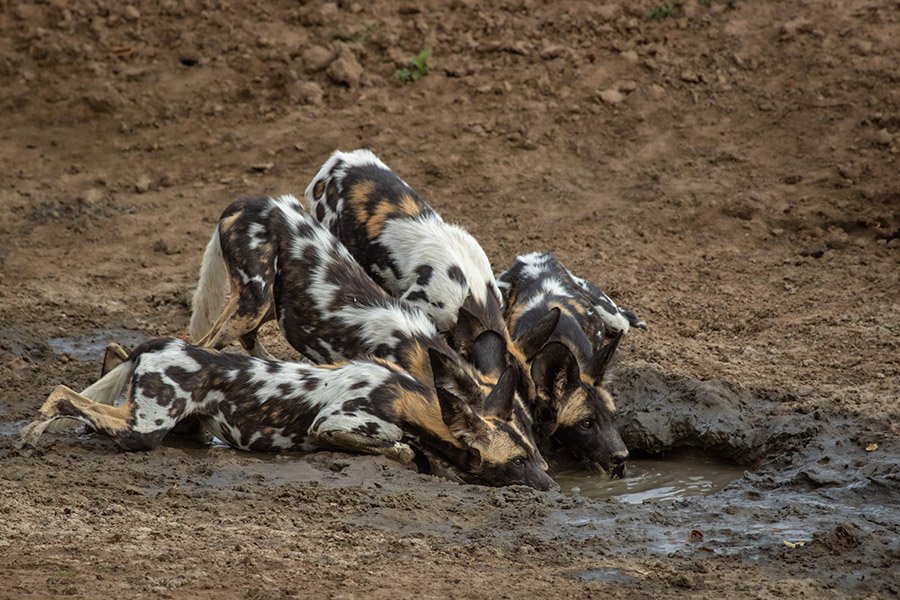
How Do African Wild Dogs Avoid Predators?
Predators and competition significantly influence the behaviors and habits of the African Wild Dog. Here’s how:
Nocturnal vs. Diurnal Activities: To minimize run-ins with competitors, especially spotted hyenas, which are mainly nocturnal, wild dogs have adapted primarily to be diurnal hunters. By adjusting their hunting hours, they can exploit times when competition or threat levels are lower.
Migration and Territorial Shifts: Being adaptive and versatile is key to survival. If an area becomes too densely populated with dominant predators or if food becomes scarce, wild dogs might choose to migrate, seeking territories that present fewer threats and more abundant resources.
Breeding Strategies: Reproduction is a vulnerable time for any species. When it comes to selecting a den, wild dogs are highly strategic. They often opt for locations that are less visible and accessible to potential threats, such as dens in thickets or in areas with good visibility to spot incoming predators from a distance.
Frequently Asked Questions
What is the biggest predator threat to African Wild Dogs?
While wild dogs face threats from multiple predators, lions pose the most significant risk. They often kill wild dogs but don’t necessarily consume them. This animosity is more about competition than it is about food.
Do African Wild Dogs ever fight back against predators?
Yes, especially when defending their pups or when cornered. Their pack mentality can make them quite formidable, especially if they have the numbers advantage. However, they usually prefer avoidance strategies with larger predators like lions.
Why don’t lions eat wild dogs after killing them?
The conflict between lions and wild dogs is primarily territorial. Lions see wild dogs as competition for prey, and by killing them, they reduce this competition. It’s not about food but dominance in the food chain.
Are humans a direct threat to African Wild Dogs?
Indirectly, humans pose a significant threat through habitat encroachment, setting up snares, and occasional direct conflicts. While not predators in the traditional sense, human activities have led to the drastic decline of wild dog populations.
How do wild dogs alert each other of approaching threats?
They use various vocalizations, from high-pitched calls to deep bellows, to convey different messages. These sounds can act as alarms, rallying calls, or even as a means to coordinate movements.
Do all pack members defend the den from threats?
Typically, while some pack members go out to hunt, others stay behind to guard the den, especially when there are pups. The pack rotates these duties to ensure there are always fresh, alert eyes watching over their vulnerable members.
Is it true that wild dogs have territories?
Yes, wild dogs are territorial animals. They mark their territories using scents to establish their presence and deter potential threats.
Learn More About African Wild Dogs
- African Wild Dog: Characteristics, Diet, Facts & More [Fact Sheet]
- African Wild Dog Habitat: Where Do Painted Dogs Live?
- Why Are African Wild Dogs Endangered? All About The Threats They Face
- African Wild Dog vs. Hyena: Their Key Differences & Who Would Win a Fight?
- 32 Really Cool Facts About African Wild Dogs
- What Do African Wild Dogs Eat? An Exploration of Their Diet
- African Wild Dog Bite Force: Into the Jaws of The Painted Dog
- Can African Wild Dogs Be Domesticated and Be Pets?
- Are African Wild Dogs Dangerous? Do They Attack Humans?
- The Secrets Behind The African Wild Dog’s Hunting Success Rate
- African Wild Dog vs. Wolf: A Comparison & Who Wins in a Fight?


